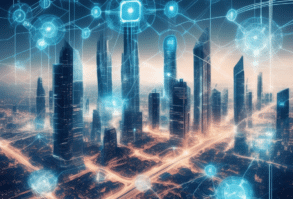Artificial Intelligence (AI) has undoubtedly become one of the most significant technological advancements of our time. From self-driving cars to virtual assistants, AI has revolutionized the way we interact with technology and has had a profound impact on various industries. However, as AI continues to advance, it is crucial to delve into its social impact and the ethical considerations surrounding its use. In this article, we will explore the intersection of AI and cybersecurity, the implications of AI on technology development, and the ethical and social implications it poses in society. By understanding these aspects, we can better navigate the complex landscape of AI and its social impact, ensuring a safe and secure future for all.
- 1. "Artificial Intelligence: Revolutionizing Technology Development and its Social Impact"
- 2. "The Intersection of Artificial Intelligence and Cybersecurity: Ensuring a Safe and Secure Future"
- 3. "Exploring the Ethical and Social Implications of Artificial Intelligence in Society"
1. "Artificial Intelligence: Revolutionizing Technology Development and its Social Impact"

Artificial Intelligence: Revolutionizing Technology Development and its Social Impact
Artificial Intelligence (AI) has emerged as a transformative technology, revolutionizing various aspects of our lives. From assisting us in our daily tasks to driving innovation in industries such as healthcare, finance, and transportation, AI has rapidly become a cornerstone of modern society. As AI continues to advance, it not only shapes the way we interact with technology but also has a profound social impact.
One of the key areas where AI has made significant strides is in technology development. AI algorithms have the ability to analyze vast amounts of data, identify patterns, and generate insights that were previously inaccessible to humans. This has led to breakthroughs in areas such as machine learning, natural language processing, computer vision, and robotics. AI-powered technologies have become smarter and more efficient, enabling us to automate complex tasks, improve decision-making processes, and enhance overall productivity.
However, with the rapid advancement of AI comes concerns about cybersecurity. As AI systems become more integrated into our daily lives, they also become potential targets for cyberattacks. Hackers can exploit vulnerabilities in AI algorithms, manipulate data inputs, and compromise the integrity of AI-powered systems. This raises concerns about privacy, data security, and the potential misuse of AI technologies.
To combat these cybersecurity challenges, there is a growing need for robust AI-driven cybersecurity solutions. AI can be utilized to detect and respond to cyber threats in real-time, identify patterns of malicious behavior, and enhance the overall resilience of our digital infrastructure. By leveraging AI algorithms, organizations can strengthen their cybersecurity posture and mitigate the risks associated with AI-powered technologies.
Beyond cybersecurity, the social impact of AI extends to various aspects of our society. AI has the potential to disrupt labor markets, with automation replacing certain job roles. While this may lead to concerns about job loss, it also presents opportunities for the creation of new roles and the reshaping of existing ones. As AI takes over repetitive and mundane tasks, it allows humans to focus on higher-level cognitive activities, creativity, and problem-solving. This shift in the workforce can lead to increased productivity, economic growth, and the potential for a more fulfilling work-life balance.
Additionally, AI has the potential to address societal challenges in areas such as healthcare, education, and sustainability. AI-powered systems can analyze medical data to assist in diagnosing diseases, personalize treatment plans, and improve patient outcomes. In education, AI can enhance personalized learning experiences, adapt curriculum to individual needs, and provide real-time feedback to students. Moreover, AI can optimize energy consumption, reduce waste, and contribute to a more sustainable future.
In conclusion, artificial intelligence is revolutionizing technology development and has a profound social impact. While it presents immense opportunities for innovation, it also raises concerns around cybersecurity and job displacement. By addressing these challenges and leveraging AI for the greater good, we can harness its potential to shape a more secure, efficient, and inclusive society. As AI continues to evolve, it is crucial to ensure that its development and deployment align with ethical principles, privacy regulations, and a commitment to social responsibility.
2. "The Intersection of Artificial Intelligence and Cybersecurity: Ensuring a Safe and Secure Future"

The development and widespread adoption of artificial intelligence (AI) have brought numerous advancements and changes to various aspects of our lives. From healthcare and transportation to education and entertainment, AI has the potential to revolutionize industries and improve efficiency. However, along with these benefits comes the need to address the potential risks and challenges that AI poses, particularly in the realm of cybersecurity.
Artificial intelligence and cybersecurity have become deeply intertwined due to the increasing reliance on AI systems for various tasks and processes. As AI technology continues to advance, it becomes more sophisticated and capable of learning and adapting on its own. This, in turn, has both positive and negative implications for cybersecurity.
On one hand, AI can greatly enhance cybersecurity measures by analyzing vast amounts of data and identifying patterns and anomalies that humans may overlook. AI-powered systems can detect and respond to cyber threats in real-time, minimizing the damage caused by attacks and improving overall security. By automating certain security processes, AI can also free up human experts to focus on more complex and strategic aspects of cybersecurity.
However, the same capabilities that make AI a valuable tool in cybersecurity also present new challenges and vulnerabilities. As AI algorithms become more complex, they become susceptible to manipulation and exploitation by malicious actors. Adversarial attacks, where AI systems are tricked or deceived into making incorrect decisions, can have dire consequences in the context of cybersecurity.
Moreover, AI systems themselves can be targets of cyber attacks. Hackers can exploit vulnerabilities in AI algorithms or manipulate the training data used to train these systems, leading to biased or erroneous outputs. This can have far-reaching implications, such as the spread of misinformation or discriminatory decision-making.
To ensure a safe and secure future in the era of AI, it is crucial to develop robust cybersecurity measures that account for the unique challenges posed by AI technology. This requires collaboration between AI researchers, cybersecurity experts, and policymakers to establish frameworks and standards that prioritize security and protect against potential threats.
Additionally, ongoing research and development efforts are needed to create AI systems that are inherently secure and resilient to attacks. This includes incorporating security measures into the design and training of AI algorithms, as well as implementing mechanisms for continuous monitoring and updating to address emerging threats.
Education and awareness also play a vital role in ensuring the safe and responsible use of AI in the context of cybersecurity. It is important for individuals and organizations to understand the potential risks and implications of AI-powered systems and to take proactive steps to protect themselves and their data.
In conclusion, the intersection of artificial intelligence and cybersecurity is a critical area that requires attention and action. The rapid advancement of AI technology brings immense potential for social impact, but it also introduces new challenges and vulnerabilities. By prioritizing security, fostering collaboration, and investing in research and education, we can ensure a safe and secure future in the age of AI.
3. "Exploring the Ethical and Social Implications of Artificial Intelligence in Society"

Exploring the Ethical and Social Implications of Artificial Intelligence in Society
As artificial intelligence (AI) continues to advance and permeate various aspects of our lives, it is crucial to examine the ethical and social implications it brings to society. While AI has the potential to revolutionize industries and improve the quality of life, it also raises significant concerns that must be addressed.
One of the primary ethical concerns surrounding AI is privacy and data security. As AI relies on vast amounts of data to learn and make decisions, there is a risk of misuse or unauthorized access to sensitive information. Ensuring robust cybersecurity measures becomes paramount to safeguard individuals’ personal information and prevent potential breaches that could have severe consequences.
Moreover, AI algorithms can inadvertently perpetuate biases and discrimination. Since AI systems learn from historical data, they can inherit the biases present in that data. This raises concerns about fairness and equity, particularly in areas such as hiring practices, loan approvals, and criminal justice. It is essential to develop mechanisms that mitigate bias in AI algorithms and promote transparency in the decision-making processes.
Another ethical consideration is the impact of AI on employment. As AI technology advances, there is a fear that it may replace human workers in various industries, leading to job displacement and economic inequality. While AI can automate repetitive tasks and enhance productivity, it is crucial to address the potential loss of jobs and ensure that individuals are adequately prepared for the changing job market through upskilling and reskilling programs.
Additionally, the social impact of AI extends to issues such as human-AI interaction and accountability. As AI systems become more autonomous and capable of making decisions on their own, questions arise regarding who should be held responsible for any harm caused by AI actions. Establishing clear guidelines and regulations becomes necessary to ensure accountability and prevent the misuse of AI technology.
To mitigate these ethical and social implications, a multidisciplinary approach is required. Collaboration between experts in AI, cybersecurity, and other relevant fields is necessary to develop ethical frameworks, guidelines, and regulations that promote the responsible use of AI technology. Additionally, public awareness and education about AI and its implications are essential to foster informed discussions and shape policies that align with societal values.
In conclusion, the rapid development of AI technology brings both opportunities and challenges. Exploring the ethical and social implications of AI in society is crucial to ensure that its deployment is done in a responsible and beneficial manner. By addressing concerns such as privacy, bias, employment, and accountability, we can harness the potential of AI while safeguarding individuals’ rights and promoting a fair and equitable society.
In conclusion, the rapid advancement of artificial intelligence (AI) has undoubtedly revolutionized technology development and is having a profound social impact. As discussed in this article, AI has the potential to enhance our lives in numerous ways, from improving efficiency and productivity to enabling new discoveries and innovations.
However, the intersection of AI and cybersecurity raises concerns about the safety and security of our future. The increasing reliance on AI in critical systems and infrastructure necessitates robust cybersecurity measures to protect against potential vulnerabilities and threats.
Moreover, as AI becomes more integrated into society, it is essential to carefully consider the ethical and social implications it brings. Issues such as job displacement, bias in algorithms, and privacy concerns need to be addressed to ensure that AI is used in a manner that benefits all individuals and respects their rights and values.
Ultimately, embracing artificial intelligence while being mindful of its potential risks and challenges is crucial. By promoting responsible development and deployment of AI technologies, we can harness its power to create a more efficient, innovative, and inclusive society.
As we continue to navigate the ever-evolving landscape of artificial intelligence and its social impact, it is imperative that professionals in the field of AI and cybersecurity work together to develop robust solutions and frameworks. By doing so, we can forge a future where AI enhances our lives while also addressing the concerns and ensuring the safety, security, and ethical use of this transformative technology.






